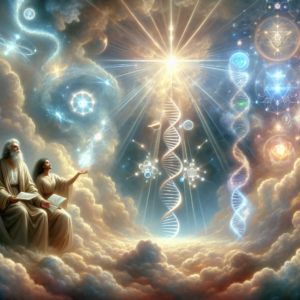Spiritual Devotional about Nature of God
Discovering the Nature of God
Isn’t it a blessing to be in a world full of wonders, full of life, full of beauty? From the majestic mountains, the flowing rivers, to the starry skies, nature becomes a beautiful testament that portrays the magnificent creativity of its Maker. Today, our spiritual journey leads us to a deeper understanding of the nature of God.
The Creator
“In the beginning God created the heavens and the earth.” (Genesis 1:1) The Bible begins with this powerful declaration, instilling in us a profound respect for our Maker. The sun’s heat, the ocean’s profundity, the wind’s song, all remind us of our Creator’s omnipotence. This principle not merely proves God’s extraordinary ability to create, but also His unfathomable love and care in creating a world where His children can flourish.
The Sustainer
God is not a distant creator who set the world in motion and then backed away. He is constantly involved in our lives and sustains all things. The Apostle Paul addressed this in Acts 17:28 when he said, “For in Him we live and move and have our being.” Every sunrise, every breath we take, every beat of our heart—these are constant reminders of God’s sustaining hand.
The Omnipresent
Do you ever gaze at the stars and marvel at their distances? In the face of the universe’s scope, it’s awe-inspiring to know that God is omnipresent. Psalm 139:7-10 says, “Where can I go from Your Spirit? Or where can I flee from Your presence?” The beautiful reality is that the God of the universe is always near, everywhere with us, aware of our needs, our joys, and our sorrows.
The Provider
The changing seasons, the cycle of day and night, the multitude of fruits and crops; all these are beautiful indicators of our God who is a provider. His provision extends not only to our physical needs but also to our spiritual needs. “And my God will meet all your needs according to the riches of his glory in Christ Jesus.” Philippians 4:19. Our God blesses us abundantly more than we think or envision.
The nature of God is beautifully represented in the world we are a part of. The Word of God serves as a lamp onto our feet, offering wisdom, guidance, comfort as we further explore His nature. By appreciating nature’s beauty, diversity, and harmony, we gain a closer, more intimate understanding of God’s character. So, as we go about our lives today, let us remember to look around. Let us pause, observe, listen. For in every element of creation, God is reaching out, gently reminding us of His unwavering love and mercy.
May your day be blessed, and may your journey bring you closer to the nature of our magnificent Creator.
Explore and dig up answers yourself with our BGodInspired Bible Tools! Be careful – each interaction is like a new treasure hunt… you can get lost for hours 🙂
Q&A about Nature of God
Q: What does the term “Nature of God” imply?
A: The term “Nature of God” captures the attributes, characteristics, and qualities that define God in various religious traditions. It includes aspects like omnipotence, omniscience, omnipresence, omnibenevolence, and immutability.
Q: What does ‘omnipotence’ mean in reference to God?
A: Omnipotence refers to the power of God to do anything that is logically possible. It portrays God as all-powerful.
Q: What is meant by the ‘omniscience’ of God?
A: Omniscience denotes the attribute of God that involves knowing everything – every fact, every event in the past, present, and future. It denotes God’s endless wisdom and knowledge.
Q: Can you explain ‘omnipresence’ in relation to God?
A: Omnipresence means that God is present everywhere at the same time. This doesn’t mean God is physically spread over the universe, but rather that God’s power, wisdom, and goodness are available everywhere simultaneously.
Q: What does ‘omnibenevolence’ say about God’s nature?
A: Omnibenevolence refers to the infinite goodness of God. This attribute signifies that God is perfectly good and that all actions and decrees are motivated by His pure love.
Q: Explain what ‘immutability’ means with regards to God.
A: Immutability signifies that God is unchanging in his character, will, and covenant promises. It means that God’s nature and being are constant and reliable, and do not evolve over time.
Q: How do different religions perceive the nature of God?
A: Different religions have varying interpretations of the nature of God. While monotheistic religions like Islam, Christianity, and Judaism view God as one supreme entity with numerous attributes like omniscience and omnipotence, polytheistic religions like Hinduism have multiple gods, each with different characteristics. Meanwhile, Buddhism does not focus on a creator god.
Q: Does the nature of God form the basis for religious doctrine?
A: Yes, the nature of God can form the basis for religious doctrine, as it often determines the faith’s theology, ethical principles, and religious practices. Believers’ perceptions of God’s attributes can influence their understanding of divine revelation, salvation, and the afterlife.
Q: Is there a universally accepted definition for the nature of God?
A: No, there isn’t a universally accepted definition for the nature of God. This depends on one’s religious convictions, personal beliefs, and spiritual experiences. Different religions provide various conceptualizations of what constitutes the divine.


